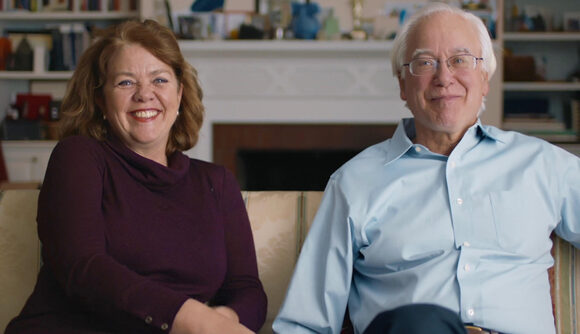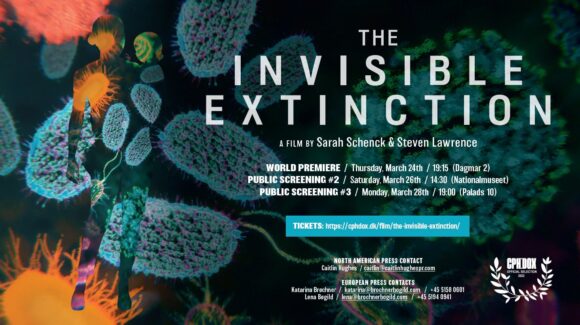
Maria Gloria Dominguez-Bello and Martin Blaser.
When Rutgers’ microbiologists Martin Blaser and Maria Gloria Dominguez-Bello (professor in the Department of Biochemistry and Microbiology) visited China in December 2017, the influence of their research was clear from the people they met. Across the country, doctors were exploring how to modify practices to control obesity and to treat children with autism with techniques to restore their gut microbiome, a topic of scholarly interest for Blaser and Dominguez-Bello.
For decades, Blaser and Dominguez-Bello, who are subjects of a new documentary, The Invisible Extinction, have researched the link between our bodies’ microbiome – the bacteria, fungi and viruses that help us digest food and keep us healthy – and diseases like diabetes, asthma and autism. In China, as elsewhere, this knowledge was being put into clinical practice.
The importance of protecting our microbiome, and the potential power of restoring lost microbiome diversity, is a key theme of the film, which chronicles the pioneering couple’s work (Blaser and Dominguez-Bello are married) from New Jersey to Switzerland – where they are building the Microbiota Vault to preserve human microbial diversity. The film premieres at the prestigious Copenhagen International Documentary Film Festival (CPH:DOX) on March 24.
The over-use of antibiotics, along with elective C-sections and the consumption of too many processed foods, is damaging our microbiome, reducing beneficial germs and creating a hidden health crisis, the two scientists insist.
The Invisible Extinction chronicles this calamity and follows Blaser, director of the Center for Advanced Biotechnology and Medicine at Rutgers Biomedical and Health Sciences, and Dominguez-Bello, the Henry Rutgers Professor of Microbiome and Health at the Rutgers School of Environmental and Biological Sciences, as they travel the world in search of answers.
 In one scene, during a research trip to her native Venezuela, Dominguez-Bello explains to a stool donor that his excrement could have benefits for humanity. Because his exposure to antibiotics has been low, Dominguez-Bello says, he possesses a rich flora of microbes that help him fight off disease and stay healthy – and that could help others, too.
In one scene, during a research trip to her native Venezuela, Dominguez-Bello explains to a stool donor that his excrement could have benefits for humanity. Because his exposure to antibiotics has been low, Dominguez-Bello says, he possesses a rich flora of microbes that help him fight off disease and stay healthy – and that could help others, too.
“When we ask them for stool samples, sometimes they laugh and they say, ‘Did you come all this way just to see my poop?’” Dominguez-Bello says to the camera. “We say, ‘Yes, because your poop contains trillions of tiny organisms that may help us find the answers to some of the world’s biggest health problems.’”
In another scene, Dominguez-Bello takes us into a delivery suite at NYU Langone Hospital, where she and others are working to determine the effects of C-sections on chronic diseases. When a child is born vaginally, the mother’s microbiome is passed to the baby, but this natural transfer is lost during a C-section. She and her team are researching whether it is possible to recreate the natural transfer of these beneficial germs after a C-section has been performed.
Calling it a global warming of the human body, Blaser says we are in a race against time and face an extinction crisis.
“It’s invisible, it’s deadly and it’s happening in all of us right now,” says Blaser. “Not unlike the planetary disaster that is climate change, if we don’t move quickly to protect and preserve the diverse microbiome of our ancestors, these helpful organisms will be lost forever.”
Over the last 70 years, due to environmental factors including antibiotic use, we have lost half of the microbes that kept our ancestors healthy by regulating the immune system and digesting food. This decline in microbial diversity, the researchers say, has coincided with (and is driving) the surge in chronic illnesses.
The making of the film, which charts the connection, began 10 years ago after its director Sarah Schenck’s child nearly died from an unexpected food allergy. That experience piqued her journalistic interest, and brought her to Blaser, who was writing his book, Missing Microbes.
Capturing the footage took creativity. In Venezuela, for instance, Dominguez-Bello’s research colleague Oscar Noya Alarcon did the filming, while in other locations, an iPhone was all that was available for shooting.
Blaser says that each trip documented in the film captures the pure intent of scientists and doctors interested in learning from each other in apolitical, collective ways. “This isn’t about one country or another,” he says. “It’s about parents with kids who have autism, or patients with illnesses linked to microbial health. As researchers, we’re seeking solutions across borders, and to me that’s very moving.”
This article first appeared on Rutgers Today.

